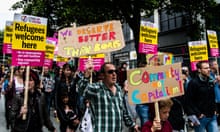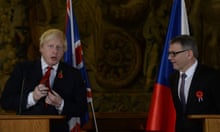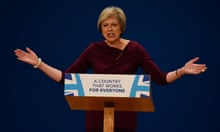European leaders have said they expect Britain to notify them of its intention to leave as early as September, and insisted the UK has no prospect of keeping access to the single market unless it continues to accept EU migration.
Meeting in Brussels without Britain for the first time, the EU’s 27 remaining members also said no negotiations on the terms of the UK’s future relationship with the EU would start before it had triggered article 50 of the Lisbon treaty, the mechanism for leaving the union.
“As soon as Britain’s new government is formed, it must file its notification and open the two-year negotiating period laid down in the treaty,” François Hollande, the French president, told an end-of-summit press conference. “So we expect this to happen in early September.”
Donald Tusk, the EU council president, added that the leaders had made it “crystal clear” that access to the single market “requires acceptance of all four EU freedoms – including freedom of movement. There can be no single market à la carte.”
The German chancellor, Angela Merkel reiterated that if Britain wanted to maintain single market access, “there will have to be trade offs elsewhere”. Europe would now wait to hear, she said, “what kind of model Britain wants.”
Although there is broad acceptance that Britain needs breathing space to appoint a new prime minister and establish what kind of future deal it hopes for, most members want Brexit under way quickly to contain the risk of Eurosceptic contagion, limit economic instability and allow the EU to move forward with new initiatives on security, growth and jobs.
European commission president Jean-Claude Juncker said Britain must now launch divorce proceedings “as soon as possible” and reiterated there could be “no negotiations whatsoever” – formal or informal – until article 50 had been invoked. He had banned his commissioners from any talks with the British, he said.
David Cameron has insisted it is Britain’s “sovereign decision” when to trigger article 50, and that initiating the withdrawal process would be a job for his successor, who is likely to be appointed by early September.
Cameron flew back to London on Tuesday night after telling his fellow heads of government over dinner that anxieties about unrestricted freedom of movement – which he said were shared by many other members states – were the root cause of the Brexit vote. The union would have to consider allowing more control over immigration, he said.
EU leaders are also scrambling to show voters that the Brexit shock will not be ignored. “Europeans expect us to do better when it comes to providing security, prosperity and hope for a better future,” a joint statement issued at the close of the conference said.
Arriving for the talks on Wednesday, leaders stressed the urgent need for the EU to pull together and move forwards with concrete plans. The Lithuanian president, Dalia Grybauskaitė, said Tuesday had been about Cameron, but Wednesday was “about us, what we are going to do about our unity”.
Belgium’s prime minister, Charles Michel, said there was “a perception of technocracy” that must be dispelled. “We have to show Europe brings a real added value that can be felt by our fellow citizens,” he said. Xavier Bettel, his counterpart from Luxembourg, said that “with a disunited United Kingdom, we need a united Europe more than ever”.
On the sidelines of the summit, Nicola Sturgeon, Scotland’s first minister, held a series of meetings with EU officials in Brussels to sound out the the possibility of Scotland – which voted overwhelmingly to remain in the EU – joining the bloc as a separate entity.
“Scotland is determined to stay in the EU,” she said after a hastily-arranged meeting with the European parliament president, Martin Schulz, but added: “I don’t underestimate the challenges that lie ahead for us in seeking to find a path.”
As Brexit fallout continued to spread, there were signs that Paris had begun manoeuvring to attract the substantial euro clearing business currently carried out in the City. Hollande said on Tuesday night a post-Brexit London should “not be able to handle clearing operations for the eurozone”.
The offensive, backed up by an advertising campaign encouraging financial services and other business to “Move on” after the referendum and relocate to the Paris region, would deal a significant blow to the City as well as boosting Hollande’s reputation ahead of next year’s French presidential elections.
Juncker was also sharply critical of the leave campaign for not having prepared for the eventuality it might win. “I thought that if you wanted to leave, you had a plan,” he said. “They don’t have it.”
Some member states – particularly Poland, which considers the UK one of its main EU allies – have speculated about whether the UK might not be persuaded to stay.
The US secretary of state, John Kerry, also wondered on Tuesday whether Brexit might ever happen, suggesting leave campaigners do not truly believe in Britain’s divorce from the EU.
Kerry, who visited Downing Street on Monday, said Cameron was loth to invoke article 50 and that the prime minister “feels powerless – and I think this is a fair conclusion – to go out and start negotiating a thing that he doesn’t believe in and he has no idea how he would do it”.
Apparently referring to Boris Johnson, one of the frontrunners to replace Cameron, he added: “And by the way, nor do most of the people who voted to do it.”
On Tuesday, many MEPs turned their backs on Nigel Farage, the Ukip leader and prominent leave campaigner, jeering and booing as he belligerently celebrated the result and told them: “You’re not laughing now.”
Marine Le Pen of France’s far-right Front National said the Brexit vote represented “a signal of liberty and freedom sent out to the entire world; a cry of love of a people for their country”. She said the British “have chosen a route which it thought was closed for all time”.
As the 27 other EU members try to bolster the bloc in light of Britain’s departure, Tusk promised to convene a special summit of leaders in Bratislava in September to which the UK will not be invited.









